Big Ocean, Big Picture
Air Date: Week of June 20, 2008
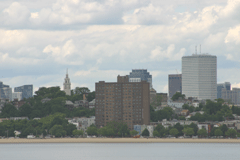
Behind the traditional sea-front houses, there’s heavy industrial and commercial development in South Boston coastline. (courtesy: Massachusetts Ocean Partnership)
A new law in Massachusetts is the first in the nation to call for a science-based plan for managing the state’s ocean. Host Bruce Gellerman speaks with Stephanie Moura, executive director of the Massachusetts Ocean Partnership, about the challenges of bringing together many interest groups to manage coastal waters.
Transcript
GELLERMAN: Massachusetts Governor Deval Patrich recently signed landmark legislation into law. It’s a brand new approach to using the ocean’s resources.
PATRICH: The Oceans Act of 2008 will make Massachusetts the first state in the nation to require a comprehensive science-based plan for the management of our ocean waters.
[HARBOR NOISES]
GELLERMAN: Here in Boston Harbor, once the place of a Revolutionary tea party, is where the revolutionary plan to manage the state’s coastline is taking shape.
MOURA: If you look around here you could swivel your head 180 degrees and see so many of the uses we’re talking about that are competing for ocean space.
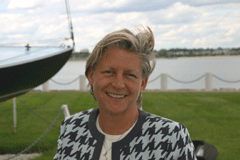
Stephanie Moura, Executive Director of the Massachusetts Ocean Partnership, stands on the shores of Boston Harbor. (courtesy: Massachusetts Ocean Partnership)
MOURA: You’ve got a power plant across the way. You’ve got Mass Port’s Connelly Terminal right there, that’s the Port of Boston Harbor. You’ve got swimming beaches right over there in South Boston, urban swimming beaches. You’ve got the Deer Island Sewage Treatment Plant. You’ve got the Boston Harbor Islands, which is a major recreational destination now.
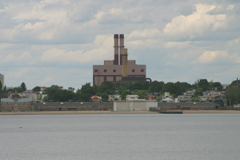
A power plant situated on Boston’s shores.
(courtesy: Massachusetts Ocean partnership)
GELLERMAN: You’ve got Boston, Logan Airport is over there and then you’ve got those LNG tanks over there.
MOURA: Yup, yup. There’s offshore LNG terminals here. If you could swivel your head that way just a bit you would see wind turbines off Hull. Now the current one there is land based but as you know there’s a lot of proposals and interest for various offshore renewable energy proposals in the water. So energy, fishing, shipping, power—you’ve got everything right here and this is only maybe two miles we’re looking at. We’ve got almost 1,900 miles of coastline to manage.
GELLERMAN: This is really an extraordinary view, this is an extraordinary historically, commercial, it’s fantastic.
MOURA: It’s fantastic, it really is.
GELLERMAN: So as I understand it, you take the stakeholders, the people who are involved directly making their earning, their living, using the ocean and the regulators, you throw in scientists, look at the ocean as a whole, and voila!

Behind the traditional sea-front houses, there’s heavy industrial and commercial development in South Boston coastline. (courtesy: Massachusetts Ocean partnership)
MOURA: And voila. You theoretically then have a better way to manage the ocean resources than what we have right now which is permit by permit. You know somebody says, “I’d like to put this wind farm there or that LNG terminal there,” and there’s no big picture, there’s nobody looking at the big picture to say, “Does this make sense here over time? What, who’s going to benefit and who’s going to lose?”
GELLERMAN: What took you soon long?
[MOURA LAUGHS]
MOURA: In some ways, I think the status quo is just very compelling. This is the way we’re used to doing things, so if it’s not that broken, why change it. But I think what’s happening here in Massachusetts and similar pressures elsewhere is that you see first of all more and more evidence that the ocean ecosystems are in jeopardy—you know, ecologically in tough shape. And one of the impetuses for trying to do things differently is that we’re trying to make sure that the ecosystems remain resilient so that they can continue to generate all these goods and services that we rely on.
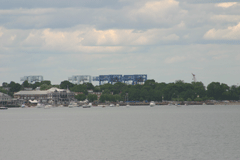
Boston’s shipping port.(courtesy: Massachusetts Ocean partnership)
However in the face of that we’ve got this massive, increasing interest or intensifying demands. There’s proposals right and left for energy development, coastal development, various desalination plants, whatever it happens to be. So you’ve got trouble brewing, plus increasing demand that means “Uh oh, we better find a way to manage these things that’s more sustainable.”
GELLERMAN: And how will you know if this is successful or not?
MOURA: I really think that the proof will be in the pudding if the user groups and the interest groups can say, “You know what? I participated in this, it isn’t perfect, but I can live with it and I think it’s a lot better than where we were eighteen months ago.”
GELLERMAN: And will the society, the people who live in Massachusetts, will they ultimately, do you think, really think, that this will help protect what they’ve got, preserve it for the future, and allow them to use it?
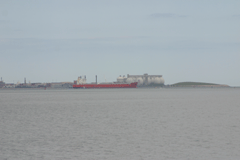
The Deer Island sewage treatment plant was an integral part in cleaning up Boston coastal waters. (courtesy: Massachusetts Ocean partnership)
GELLERMAN: When you think about this, it’s so ambitious, does it give you the willies? I mean, you gotta really make this thing work.
MOURA: Yes. I get up every morning and think, “Do I love this job or hate this job?” and mostly I come down on that I love it. It is, it’s a fantastic challenge. Fantastic because there’s all the politics involved and that is a messy but wonderful puzzle. There’s a shortage of resources—and when I say resources here I’m talking funding—and so the fact that the partnership has been able to amass this private funding to help interject in the process is going to be a tremendous help, I think, to move things forward. But it is gonna be, especially in an eighteen month timeframe, it is going to be heavy lifting every day and it’s going to take a lot of cooperation. We’re going to have to build new levels of cooperation and that is, that’s exciting.
GELLERMAN: Well Stephanie good luck. I think you’re gonna need it.
MOURA: Thank you Bruce. I can guarantee you we’re going to need and I appreciate your time.
GELLERMAN: Stephanie Moura is the Executive Director of the Massachusetts Ocean Partnership.
Links
Living on Earth wants to hear from you!
Living on Earth
62 Calef Highway, Suite 212
Lee, NH 03861
Telephone: 617-287-4121
E-mail: comments@loe.org
Newsletter [Click here]
Donate to Living on Earth!
Living on Earth is an independent media program and relies entirely on contributions from listeners and institutions supporting public service. Please donate now to preserve an independent environmental voice.
NewsletterLiving on Earth offers a weekly delivery of the show's rundown to your mailbox. Sign up for our newsletter today!
 Sailors For The Sea: Be the change you want to sea.
Sailors For The Sea: Be the change you want to sea.
 The Grantham Foundation for the Protection of the Environment: Committed to protecting and improving the health of the global environment.
The Grantham Foundation for the Protection of the Environment: Committed to protecting and improving the health of the global environment.
 Contribute to Living on Earth and receive, as our gift to you, an archival print of one of Mark Seth Lender's extraordinary wildlife photographs. Follow the link to see Mark's current collection of photographs.
Contribute to Living on Earth and receive, as our gift to you, an archival print of one of Mark Seth Lender's extraordinary wildlife photographs. Follow the link to see Mark's current collection of photographs.
 Buy a signed copy of Mark Seth Lender's book Smeagull the Seagull & support Living on Earth
Buy a signed copy of Mark Seth Lender's book Smeagull the Seagull & support Living on Earth

